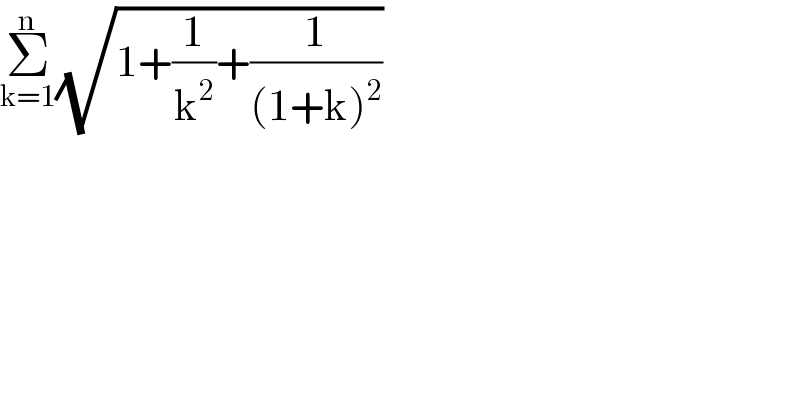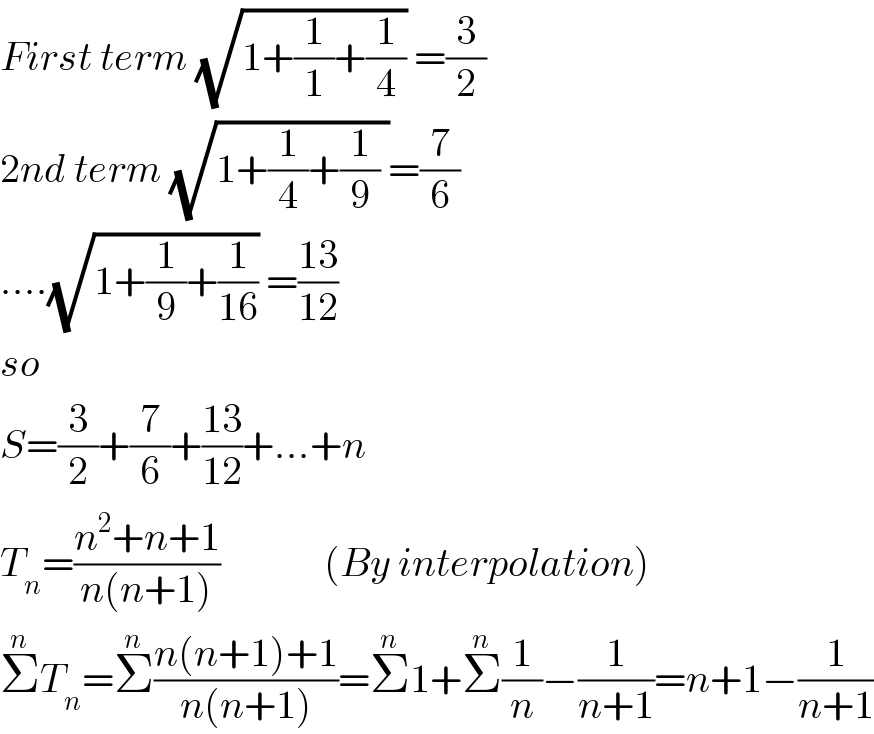
Question Number 107974 by Ar Brandon last updated on 13/Aug/20

$$\underset{\mathrm{k}=\mathrm{1}} {\overset{\mathrm{n}} {\sum}}\sqrt{\mathrm{1}+\frac{\mathrm{1}}{\mathrm{k}^{\mathrm{2}} }+\frac{\mathrm{1}}{\left(\mathrm{1}+\mathrm{k}\right)^{\mathrm{2}} }} \\ $$
Answered by Dwaipayan Shikari last updated on 14/Aug/20

$${First}\:{term}\:\sqrt{\mathrm{1}+\frac{\mathrm{1}}{\mathrm{1}}+\frac{\mathrm{1}}{\mathrm{4}}}\:=\frac{\mathrm{3}}{\mathrm{2}} \\ $$$$\mathrm{2}{nd}\:{term}\:\sqrt{\mathrm{1}+\frac{\mathrm{1}}{\mathrm{4}}+\frac{\mathrm{1}}{\mathrm{9}}\:}=\frac{\mathrm{7}}{\mathrm{6}} \\ $$$$....\sqrt{\mathrm{1}+\frac{\mathrm{1}}{\mathrm{9}}+\frac{\mathrm{1}}{\mathrm{16}}}\:=\frac{\mathrm{13}}{\mathrm{12}} \\ $$$${so} \\ $$$${S}=\frac{\mathrm{3}}{\mathrm{2}}+\frac{\mathrm{7}}{\mathrm{6}}+\frac{\mathrm{13}}{\mathrm{12}}+...+{n} \\ $$$${T}_{{n}} =\frac{{n}^{\mathrm{2}} +{n}+\mathrm{1}}{{n}\left({n}+\mathrm{1}\right)}\:\:\:\:\:\:\:\:\:\:\:\:\:\left({By}\:{interpolation}\right) \\ $$$$\overset{{n}} {\sum}{T}_{{n}} =\overset{{n}} {\sum}\frac{{n}\left({n}+\mathrm{1}\right)+\mathrm{1}}{{n}\left({n}+\mathrm{1}\right)}=\overset{{n}} {\sum}\mathrm{1}+\overset{{n}} {\sum}\frac{\mathrm{1}}{{n}}−\frac{\mathrm{1}}{{n}+\mathrm{1}}={n}+\mathrm{1}−\frac{\mathrm{1}}{{n}+\mathrm{1}} \\ $$
Commented by Dwaipayan Shikari last updated on 14/Aug/20

$${y}_{\mathrm{0}} \:\bigtriangleup{y}_{\mathrm{0}} \:\bigtriangleup^{\mathrm{2}} {y}_{\mathrm{0}} \\ $$$$\mathrm{3}\:\:\:\:\:\:\:\:\:\:\:\:\:\:\:\: \\ $$$$\:\:\:\:\:\:\:\:\mathrm{4} \\ $$$$\mathrm{7}\:\:\:\:\:\:\:\:\:\:\:\:\:\mathrm{2}\:\:\: \\ $$$$\:\:\:\:\:\:\:\:\:\mathrm{6} \\ $$$$\mathrm{13}\:\:\:\:\:\:\:\:\:\:\mathrm{2} \\ $$$$\:\:\:\:\:\:\:\:\mathrm{8} \\ $$$$\mathrm{21} \\ $$$${y}=\mathrm{3}+\mathrm{4}\left({n}−\mathrm{1}\right)+\left({n}−\mathrm{1}\right)\left({n}−\mathrm{2}\right)={n}^{\mathrm{2}} +{n}+\mathrm{1} \\ $$$$\mathrm{2}+\mathrm{6}+\mathrm{12}+.. \\ $$$$\mathrm{2}\left(\mathrm{1}+\mathrm{3}+\mathrm{6}+..\right)=\mathrm{2}\frac{{n}\left({n}+\mathrm{1}\right)}{\mathrm{2}}={n}\left({n}+\mathrm{1}\right) \\ $$$$ \\ $$
Commented by Ar Brandon last updated on 14/Aug/20
Thanks bro ��
Commented by Dwaipayan Shikari last updated on 14/Aug/20
��
